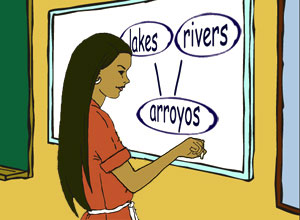What should Ms. Begay find out about her students before planning her curriculum units and lessons?
Page 7: Understand the Learning Process
 Ms. Begay now turns her attention to understanding how her students learn and remember—or why they struggle to learn and remember—the information she teaches them in the classroom. Learning about this process will be useful when Ms. Begay decides which strategies will best help her students to succeed academically.
Ms. Begay now turns her attention to understanding how her students learn and remember—or why they struggle to learn and remember—the information she teaches them in the classroom. Learning about this process will be useful when Ms. Begay decides which strategies will best help her students to succeed academically.
The learning process, Ms. Begay soon finds out, is typically divided into three stages:
- Receiving information
- Connecting the information to prior knowledge
- Using the information
Receiving Information
It is important for Ms. Begay to understand that information that is not paid attention to will quickly be lost. However, when students do pay attention to it, the information enters the short-term memory. Here, the information can be consciously attended to and worked on. In fact, that is why researchers sometimes call short-term memory the working memory. Though information placed in short-term memory will only remain there for a relatively limited amount of time, it can now be moved into the long-term memory, where it will be stored permanently. However, this process of transferring information from short-term to long-term memory does not occur automatically. Ms. Begay knows that if she is to help her students to better learn and remember new information, she must help them place that information into their long-term memories.
Connecting the Information to Prior Knowledge
There are a number of possible strategies for facilitating the movement of information into the long-term memory, among them organizing information into easily recognizable categories (e.g., all proper names are nouns), repeating the information (i.e., in-class recitations), and grouping the information (e.g., we usually remember phone numbers as two groups of numbers, three and four).
 One learning strategy that Ms. Begay often uses to help her students more quickly and easily remember new information or vocabulary words is a key-word strategy. When using this strategy, students link the new information or word to an already familiar word and (often) an accompanying image. The familiar word sometimes shares an initial sound or may rhyme with the key word. For instance, a teacher might produce a picture of a person dressed in gold, shouting, “Hey, you!” to help her students remember that AU is the chemical symbol for gold on the periodic table. Ms. Begay also knows that acronyms and mnemonic devices can be useful teaching tools. For example, students who wish to learn the names and (eastward) geographical order of the Great Lakes might do so by memorizing the mnemonic Sergeant Major Hates Eating Onions, the first letter of each word standing for Superior, Michigan, Huron, Erie, and Ontario. Similarly, the names of the Great Lakes are often taught via the acronym HOMES.
One learning strategy that Ms. Begay often uses to help her students more quickly and easily remember new information or vocabulary words is a key-word strategy. When using this strategy, students link the new information or word to an already familiar word and (often) an accompanying image. The familiar word sometimes shares an initial sound or may rhyme with the key word. For instance, a teacher might produce a picture of a person dressed in gold, shouting, “Hey, you!” to help her students remember that AU is the chemical symbol for gold on the periodic table. Ms. Begay also knows that acronyms and mnemonic devices can be useful teaching tools. For example, students who wish to learn the names and (eastward) geographical order of the Great Lakes might do so by memorizing the mnemonic Sergeant Major Hates Eating Onions, the first letter of each word standing for Superior, Michigan, Huron, Erie, and Ontario. Similarly, the names of the Great Lakes are often taught via the acronym HOMES.
Using the Information
Many researchers believe that information placed into long-term memory will remain there permanently. However, just because the information has been successfully stored does not mean it is always easy to retrieve. Ms. Begay knows that if she is to help her students, she will have to teach them ways to more effectively and reliably retrieve the information after she has taught it to them in class.
 Fortunately for Ms. Begay and her students, information that has been placed into long-term memory in an organized way can often be more easily recalled. Certain strategies, too, can help to facilitate the retrieval process. For example, during a lesson in social studies, a teacher might use a word web to help her students to link new knowledge to information they have already learned. That is, students who have already learned quite a bit about arroyos might find it helpful to link that information to new knowledge about lakes and rivers. In addition to these types of links, teachers might come up with creative ways to connect new lessons to topics that students are interested in outside the classroom. For instance, if her students’ interest in the Olympic Games has led them to learn the names of foreign countries, the teacher might use that interest to develop a lesson on geography.
Fortunately for Ms. Begay and her students, information that has been placed into long-term memory in an organized way can often be more easily recalled. Certain strategies, too, can help to facilitate the retrieval process. For example, during a lesson in social studies, a teacher might use a word web to help her students to link new knowledge to information they have already learned. That is, students who have already learned quite a bit about arroyos might find it helpful to link that information to new knowledge about lakes and rivers. In addition to these types of links, teachers might come up with creative ways to connect new lessons to topics that students are interested in outside the classroom. For instance, if her students’ interest in the Olympic Games has led them to learn the names of foreign countries, the teacher might use that interest to develop a lesson on geography.